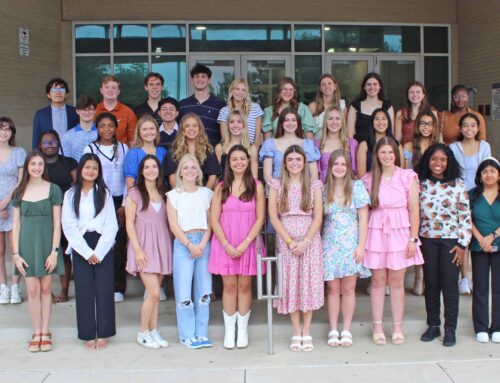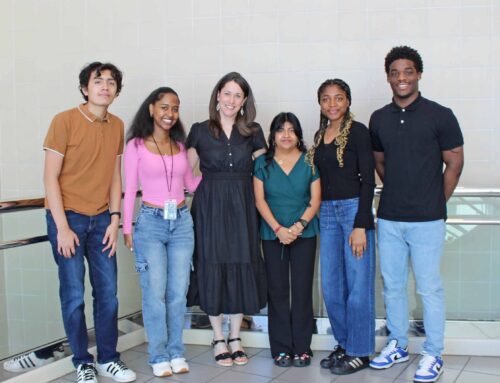High school is all about fitting in. Anything that sets kids apart during those formative years is a tough pill for them to swallow. Because of this, a stereotype of teenagers has emerged that often isn’t complimentary: That they’re entrenched in popular culture and live in a fast-paced world that has little to do with reality.
However, the human spirit has never changed as much as trends do, and for this story we celebrate some classic values found in unlikely sources. What neighborhood residents Josh Hicks, Nick Gray, Tiara Littlejohn and Lorena Manellari have in common is not outwardly visible. All four are among more than 550 graduating seniors at Lake Highlands High School, and each has been faced with jarring life-changes that even the wisest adult would find difficult to weather.
“We’ve got a lot of great kids here,” says neighborhood resident Chris Goff, a guidance counselor at LHHS.
“And there are a lot of wonderful stories, but strength of character and a very strong spirit are what sets these students apart. They add another dimension to my job because it’s a joy for me to see kids like this; to see the growth and how they’ve orchestrated that.”
Man of the House / When a parent dies, at any age, it’s a loss of one of the things in this world that we all share, and the gulf can feel endless.
Josh Hicks’ father was diagnosed with colon cancer a year and a half ago, and he died three weeks later. Sixteen-year-old Josh had to forge ahead as the man of the house more quickly than he had expected to. Point guard for the basketball team, a good student, peer helper, nominee for “Man of LHHS” and Character Counts winner, Hicks was always an admired teen. The death of his father, though, proved to everyone around him just how deep that reservoir went.
He’s an incredible young man who handled an incredible situation with a grace beyond his years,” says counselor Stacey Ruff. “Everyone here respects him.”
“I draw strength from people around me,” Hicks says in a soft voice. “Older people that I know have more wisdom, have been through more stuff than I realize. I just try to look at what other people who are successful do.”
Generally, that means listening to his mother – a pastor Hicks credits with playing a major part in his everyday life – and to his “church family.” With strong faith and family ties, the survival of this event has shown Josh his calling. “My faith has gotten stronger in the last year and a half,” he says, “and my goal one day is to help teenagers who are going through this situation.” During basketball season, Hicks still finds the time to help his mother, who is attending college, by shuttling his younger siblings home from school before after-school practice begins. Basketball has been a life-long passion for Hicks, and he credits it with helping him release tension and remain focused after his father’s death.
Turning his sights to life after high school, Hicks appears to have gleaned the secret many teenagers don’t learn until long after they’ve graduated.
“A lot of people don’t take high school seriously, but I’m starting to understand that the decisions that I make here are going to affect me forever. So far, I think I’ve done a pretty good job of being focused on what I need to focus on.
“I think going away to school seems like the best thing to do…it would help me grow up a bit more.”
An Inner Vision / Nick Gray sees things in a different way than most teenagers. Because of a progressive eye disease called macular degeneration, his eyesight has been gradually failing him since he was 12.
Gray may not see very well these days – his eyes have a hard time focusing – but it’s apparent he still understands the big picture. One of the ways he handles his difficult situation is through humor.
An avid golf player, Gray says he can “see the ball going, but after a certain point I just don’t see it. So, if anything bad happens, I just don’t know,” he smiles.
From year to year, he doesn’t know how the disease will affect his ability to see. The loss of his eyesight has been gradual, but not outwardly apparent.
“I don’t feel like everybody has to know,” he says. “But it is a constant cycle, because every year you have to tell new teachers the situation.”
All of the paperwork he receives must be in larger type than is customary, and when all the other students get time to study in class, Gray must wait until he goes home and can use his magnifying glass.
“Whining does nobody any good, and it just makes people around you think less of you,” he says. “I do get extremely frustrated, but I’ll just go somewhere and hit some golf balls to release everything.”
Gray’s college-age brother also suffers from macular degeneration, and that experience helps the younger Gray weather the storm.
“Well, my parents are great and, with my brother, you kind of get that vibe between each other that you’re not alone.”
In other ways, though, Gray does stand alone. He has found a way to graduate in the top 10 percent of his class, take on all kinds of advanced-level courses and hold a part-time job, all the while dealing with not knowing what he may have been without the disease and where it will take him next.
“I think I’m a smart enough kid that if I didn’t have [macular degeneration], I could be one of the top 30 students in our class. But when I go home, I have to do two or three times as much work as everyone else…
“It’s just another concern that people don’t have to deal with,” he says with a shrug.
Moving On Up / Teenagers are prone to identity crisis for a number of reasons; call it the collateral damage of being young. For Tiara Littlejohn, there is no crisis, but there are two starkly different identities with which to contend.
One goes to school, is ranked in the top 10 percent of her class, plays basketball and runs track; the other works 30-hour weeks as a pharmacy technician and helps her mother take care of her 14-year-old brother. For Tiara, though, there’s always something else she can dream of tackling: being a doctor, a lawyer, a camera operator or even a track contender in the Olympics.
If only she had more time.
“I don’t want free time to watch TV,” she says. “I want to sleep!”
What she really wants, however, is some respect: It’s what drives her to complete and excel at all of these tasks.
“Money and responsibility,” Littlejohn says of her drive to succeed. “I don’t want to be labeled like every other teenager is.
Her employer doesn’t seem to find that a difficult request. They have already offered Littlejohn a scholarship to SMU if she will study to be a doctor of pharmacy, and she has accepted.
“I had to get a job to help my mother pay for bills because she was disabled and fired from her job,” she says. “But my mother’s discipline is what helps me. She’s my reinforcement. Whether you think she knows something or not, she does. She knows everything,” Littlejohn says.
Tiara has moments where she sees the totality of things, as well.
“When I actually sit down and think about it, I realize that what I do is kind of special, but I don’t do that very often, because I’m moving all the time.”
Grace Under Pressure / There is so much to learn, both academically and personally, during the teenage years. Add to that adapting to the nuances of a new culture, and you’re facing a tall order at age 14.
Lorena Manellari and her family moved to Lake Highlands three years ago after the situation in their native Albania became unlivable. Although affluent and socially conscious in their former country, Lorena’s parents have had a difficult time learning a new language at their age. And in order to catch up with her classmates, Lorena had no choice but to “memorize” vocabulary words.
Today, Lorena is in AP English 4, is in the top 25 percent of her graduating class, and is a member of National Honor Society, Mu Alpha Theta and the school’s swim team. She’s become a bona fide successful American overachiever.
But she can never take herself far from the memory of those first years in the United States because in them are the reasons she works so hard to succeed.
“The first year, I felt like I was in the middle of nowhere,” she says. “I didn’t know anybody or anything. But I realized that it was not only hard for me, it was hard for my parents. Knowing that they sacrificed everything for me, I decided to try harder.”
Lorena has decided that going away to college is out of the question – “I don’t want to be apart from my family,” she says.
But her philosophy is strictly that of an individual.
“If you try hard enough, there is nothing you can’t do,” she says. “And there is no one who can save you but yourself.”





